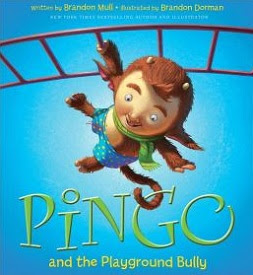
Here are my three real wishes:
1. Get tall.
2. Have an adventure.
3. Meet my father.
It is the last day before summer vacation in Mrs. Roberts' sixth grade class, and Annie is ready with three fake wishes for the predictable essay "Three Wishes I'd Like to Fulfill over Summer Vacation." Gran has always said that if you were going to lie, be a good liar, and Annie's essay has three plausible wishes that she knows are all lies that aren't going to happen.
And Annie knows her real wishes aren't going to happen either. She's short like Gran, the tiny town of Sunshine is perennially short of adventures, and as for her third wish...
"...that was the unlikeliest wish of all. Because even if I drank a magic elixir and sprouted a few feet, and even if angry revolutionaries suddenly stormed the streets of boring old Sunshine, wish number three was impossible. I could never meet my father. My father was dead."
But in Adina Rishe Giwirtz's debut novel,
Zebra Forest
(Candlewick, 2013), all three wishes are granted in a way Annie could never have predicted.
Ever since her mother dumped Annie and her younger brother Rew off with Gran, saying simply,
"they were his idea, not mine," Gran has told them that their father is dead, killed by an anonymous "evil man" in a fight, and the house on the edge of the zebra forest, a woods of white birches and black oaks, has been their whole world. Gran is loving but unpredictable and depressive, and her days of withdrawal to her room have become more and more frequent. Annie has learned how to do the shopping, pick up mail from their box at the post office, pay the bills, and be a good liar whenever people inquired about Gran's health. There are plenty of her father's old books to read, especially their favorite
Treasure Island, and Rew loves the adventure stories that Annie makes up about their father as a famous spy, a pirate, always a hero.
But then a prisoner revolt and mass escape at the nearby state penitentiary makes Sunshine the top item on national news, and Annie's summer adventure begins when an escapee breaks into their house and holds them hostage, threatening her and forcing Annie to lie convincingly to the police who search the countryside around the prison. As several weeks pass, Annie begins to suspect that their captor knows more about her family than seems possible, and finally she guesses that he is her father, her father who was not the victim but indeed the killer in that struggle.
And gradually, as Annie comes to know him, he begins to seem less like an evil man and more like a man who could have been, and is, their father. Rew still plots escape, but Annie finds herself somehow drawn to Andrew Stone and calculating to prevent their father's discovery, understanding more and more about her family's strange history as the summer passes.
While Annie grows little in the physical sense that summer, she does grow and mature emotionally in this new coming-of-age novel. Like the zebra forest which changes with the seasons, the birches shedding their white bark and the oaks greening over, Annie comes to see that things are not so black and white as the younger Rew sees them. Giwirtz's debut is impressive, with a slow but suspenseful exposition, part mystery, part suspense story, part character-driven novel that becomes increasingly compelling as layers of family history are peeled away like birchbark and a new family story, one without lies, emerges.
Above us the bare branches crisscrossed the sky, the white ones nearly disappearing against the clouds. I thought how much I liked winter in the Zebra when you could see the intricate pattern of those branches.
But then, I like all the seasons, and I like that they'll come round next year, too.
It's nice to know, though, that some things really do change.
Kirkus Reviews says,
"Gewirtz's emotionally intense debut novel about the complications of families offers a perceptive heroine and poetic, impressive prose."Labels: Father and Child--Fiction, Mystery Fiction (Grades 4-7)
 Schools are out (or coming down the home stretch) and soon long summer days will stretch out ahead of students. There are lots of great things to do in the summer, but one of the best is having time to flop down on the front porch, on that hard bunk at camp, on a beach towel, or in bed at night with chirping crickets and distant lightning outside the window and just--read a good book.
Schools are out (or coming down the home stretch) and soon long summer days will stretch out ahead of students. There are lots of great things to do in the summer, but one of the best is having time to flop down on the front porch, on that hard bunk at camp, on a beach towel, or in bed at night with chirping crickets and distant lightning outside the window and just--read a good book.




















